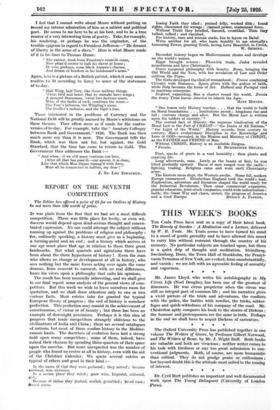REPORT ON THE SEVENTH COMPETITION
• The Editor has offered a prize of £5 for an Outline of History in not more than 100 words of prose.
IT was plain from the first that we had set a most difficult competition. There was little place for levity, or even wit.
Success would depend upon dead-serious thought and concen- trated expression. No one could attempt the subject without running up against the problems of religion and philosophy :
for, ordinarily speaking, a history must give us a beginning, a turning-point and an end ; and a history which arrives at our age must place that age in relation to those three great
-landmarks. But what quarrels and agitations there have been about the three hypostases of history I Even the man who allows no change or development at all in history, who sees nothing but the same forces acting over again the same dramas, from moment to moment, with no real differences, bases his views upon a philosophy that suits his opinions. The result has been unusually interesting, and we shall give in our final report some analysis of the general views of com- petitors. But this week we wish to leave ourselves room for quotation, and we shell draw attention only to one or two curious facts. Most entries take for granted the typical European theory of progress ; the end of history is somehow perfection. This perfection may consist in the achievement of consciousness, of virtue or of beauty ; but there has been no example of downright pessimism. Perhaps it is this idea of progress that made competitors strangely oblivious to the civilizations of India and China ; there are several catalogues of nations, but most of them confine history to the Mediter- ranean basin. The doctrines of evolution have laid a strong hold upon many competitors ; some of them, indeed; have ruined their chances by spending thi:ee-quarters of their space upon the amoeba. But more unexpected was the number of people who found no centre at all in history, even with the aid of the Christian Calendar. We quote several entries as typical of others and good in their kind :— In the name of God they were gathered ; they served ; became ;rational, won victories.
In a secure placer they ruled ; grew wiser, Imperial, cultured,
'rich. , Boeauscr of tithes' they Pushdd, moiled,-,grumbled ; loved ease ; deared pains.
Losing Faith they idled ; praised folly, worked filth ; found rights, clamoured for wrongs ; claimed power, contemned force. Without Truth they levelled, fissured, crumbled. Then they talked, talked ; and vanished.
For history, man and woman made, lies in layers on Babel. Write another for all, who learn humbly to see - eternally ; honouring Power, greeting Truth, loving Love Beautiful, in Christ.
W. SHIRLEY.
Recorded history began on Mediterranean shores and develops on the world's waters.
Egypt brought science : Phoenicia trade. Judea revealed monotheism and later Christianity. Greece tempered philosophy with beauty. Rome, bringing the Old World and the New, with her revelation of Law and Order outlives the Popes.
The Gotha developed the ideal of womanhood ; France combining Chivalry with Romance. Spain glows with the ardour of faith, while Italy becomes the home of Art. Holland and Portugal vied in maritime enterprise.
- England, expanding, flies a charter round the world. Russia the weary Titan leaves America to inherit the Ages.
MARY HINVES.
" One lesson only History teaches, . . . that the world is built on Moral foundations. . . . Institutions perish ; kingdoms rise and fall ; customs change and alter. But the Moral Law is written upon the tablets of eternity."*
The central fact of History, the supreme vindication of the Moral Law is the Fact of CHRIST—" the Desire of All Nations," " the Light of the World." History records, from century to century, Man's evolutionary Discipline in the Knowledge and Love of GOD—revealed, in the Mission and Ministry of CHRIST, as the FATHER and FRIEND of Man.
Without CHRIST, History is an insoluble Enigma.
*Fronde. H. Inesrarasm-ra First, specks of green in a vast humidity ; then plants and crawang life.
Long afterwards, man. Lowly as the beasts at first, he was lifted gradually upward. Races of men ranged over the earth— fighting, trading. Religions came and went until Christianity arose.
The Eastern races slept, the Western awoke. Rome fell, modern Europe commenced. Elizabethan England took the world's lead. Exploration, adventure and literature shaped the world ready for the Industrial Revolution. Then came commercial expansion, popular education, joint-stock companies, world-wide industrialism- lastly, the Great War and chaos, unrest, the progress of America


























































 Previous page
Previous page